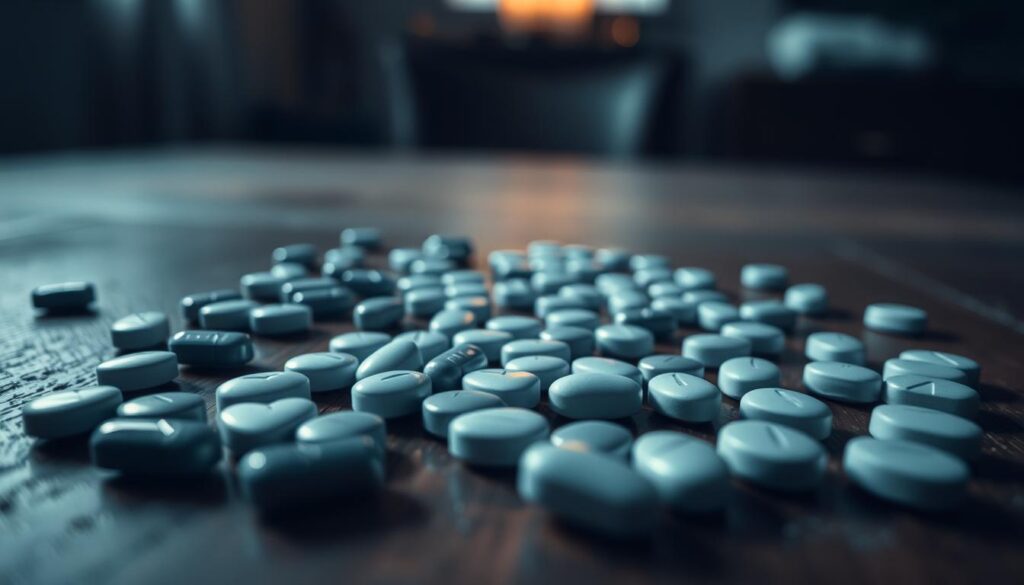Libido is about wanting sex. It’s affected by age, hormones, stress, and more. Too much libido can be a problem. It might mean you’re addicted to sex.
It’s important to know about libido before taking certain pills. This helps you make smart choices.
Key Takeaways
- Libido is influenced by a variety of biological, psychological, and social factors.
- High libido can become problematic if it leads to compulsive sexual behavior or disrupts your life.
- Certain medications, drugs, and health conditions can impact your sex drive, either increasing or decreasing it.
- Consulting a healthcare professional is recommended if you’re concerned about your libido levels.
- Lifestyle changes and alternative treatments may also help manage high libido in some cases.
Understanding Libido and Sexual Desire
Your sex drive, or libido, comes from many things. It’s shaped by biology, psychology, and society. Changes in sex drive are normal. It’s key to know what affects your sexual desire.
What Determines Your Sex Drive?
Things like testosterone and estrogen levels matter a lot. So does your physical health. Also, stress, mental health, and how you feel about yourself can change your desire for intimacy.
Normal vs. High Libido Levels
What’s normal for sex drive varies a lot. What one person finds high, another might see as just right. But, if your sex drive is too high and it’s messing with your life, you might need help.
Biological and Psychological Factors
Things like your health, hormones, and mind can affect your sex drive. For example, medical conditions and medications can change it. So can big life events like menopause or pregnancy. Also, stress, how you see your body, and your relationships can play a big role.
Knowing how biology and psychology mix can help you manage your sex drive. If you need to, look for low libido treatment.
Common Reasons for Seeking Sex Drive Reduction
Many people want to lower their sex drive for different reasons. One big reason is sexual preoccupation. This means feeling too much sexual arousal or having strange sexual thoughts that don’t go away.
Also, if you score 2 or higher on certain sexual self-regulation items, you might need help. This could mean taking libido-lowering drugs, desire-reducing pills, or anti-aphrodisiac medication.
These treatments are not a quick fix. They are part of a bigger plan to solve the problem.
Some men feel upset if their sex drive changes, especially if they are very active in their relationships. A drop in libido can happen for many reasons. This includes getting older, being in long-term relationships, and some health issues or side effects from medicine.
- Healthy testosterone levels for males range between 450 and 600 nanograms per deciliter (ng/dL), with levels falling below 300 ng/dL considered low testosterone.
- Taking medications such as high blood pressure medications, certain antidepressants, and opioid pain relievers could lower testosterone levels and lead to low libido.
- Chronic illnesses in males, such as heart disease, type 2 diabetes, and obesity, can commonly impact libido and erectile function.
If you always feel like you don’t want sex, you should see a doctor. They will look at your medical history and figure out why. Then, they can help you find the right treatment.
Medical Options for Pills That Lower Sex Drive
There are many medical options for managing a high sex drive. These include anti-androgen medications, SSRI (selective serotonin reuptake inhibitor) medications, and hormone-based treatments. Each one works differently to lower sexual desire. They are usually prescribed after the person agrees to treatment and knows the risks and benefits.
Anti-Androgen Medications
Anti-androgen medications, like cyproterone, block male sex hormones. This can reduce sexual urges and libido. Cyproterone is mainly used for prostate cancer and hypersexuality in men. It’s also in some birth control for acne and too much hair.
SSRI Medications
SSRI medications, such as Addyi (flibanserin), are another choice. These antidepressants can lower sex drive. They might help those with high libido or hypoactive sexual desire disorder (HSDD).
Hormone-Based Treatments
Hormone treatments, like those with progesterone or estrogen, can also manage high libido. They change hormone levels to reduce sexual desire.
Remember, these medical options aren’t the only way to manage high sex drive. They should be used with other strategies and under a doctor’s care.
“Cyproterone belongs to a group of medicines known as anti-androgens and is used in the treatment of two different conditions: prostate cancer and hypersexuality in men.”
Cyproterone: A Primary Treatment Option
If you want to lower your sex drive, Cyproterone is a good choice. It’s an anti-androgen medication. It blocks male sex hormones and lowers their production.
This drug helps control too much sex drive in men. It’s great for those with compulsive sexual behaviors. It also helps with other conditions caused by too much sex desire.
Research shows Cyproterone works well for many issues. It treats acne, too much body hair, early puberty, and even prostate cancer. In women, it helps with skin and hair problems in up to 90% of cases.
For men, it stops acne and slows down hair loss. It’s given in doses of 25 to 100 mg a day. It also helps with high androgen levels in PCOS and CAH, when used with estrogen.
“Cyproterone acetate was first marketed as an antiandrogen in 1973 and as a progestin in a birth control pill in 1978.”
But, Cyproterone can have side effects. These include lower sperm count, tiredness, hot flushes, and weight changes. It’s key to see a doctor often and get blood tests to check how you’re doing.

If you’re thinking about using Cyproterone or other anti-androgen meds, talk to a doctor. They can help you decide and support you during treatment.
Natural and Dietary Approaches to Reducing Libido
Some people might want to try natural ways to lower their libido instead of medicine. They might look into the Mediterranean diet, herbal supplements, and what foods affect sex drive.
Mediterranean Diet Impact
The Mediterranean diet is full of veggies, fruits, whole grains, and healthy fats. It might help women with sex problems. A 2015 study showed women eating like this had less sex issues than others.
Herbal Supplements and Their Effects
Some herbs might lower sex drive. But, there’s not much science to back this up. For example, licorice might lower testosterone, but we need more studies.
Nutritional Considerations
Not getting enough vitamins and minerals can make you less interested in sex. Eating a balanced diet can help keep your libido healthy. But, changing your diet should be done with a doctor’s help.
Natural ways might help a bit, but we need more research. Always talk to a doctor before trying new things to manage your sex drive.
“Dietary changes should be made under medical supervision to ensure safety and effectiveness.”
Safety and Side Effects of Libido-Reducing Medications
It’s important to know about the side effects of medications that lower sex drive. These drugs can cause problems like reduced sperm count and fatigue. They might also lead to hot flushes, weight changes, and depression.
Some of these drugs can harm your liver and adrenal glands. That’s why you need regular health checks and blood tests. Tell your doctor right away if you notice yellow skin or eyes, stomach pain, or mood changes.
Studies show that antidepressants can cause sexual problems in up to 59.1% of people. Men might be more affected than women. Some antidepressants, like paroxetine and sertraline, cause more sexual side effects than others.
| Medication Type | Reported Sexual Dysfunction Rates |
|---|---|
| Paroxetine | 65% |
| Fluvoxamine | 59% |
| Sertraline | 56% |
| Fluoxetine | 54% |
| Mirtazapine | 36%-43% |
| Venlafaxine | 58%-70% |
| Moclobemide | 3.9% |
Always talk to a doctor before taking medications that lower sex drive. They can help you understand the risks and benefits. This way, you can find the best solution for you.
The Role of Professional Medical Assessment
Before starting any libido-reducing medication, a professional medical assessment is crucial. This involves talking about your sexual health with a doctor. You’ll also review your medical history and reports.
It may include talking to others involved in your care. The goal is to see if you need medication.
And it checks your sexual and physical health.
When to Seek Medical Help
If you notice changes in your sexual desire or function, see a doctor. Sexual health issues can be complex. They often involve physical, emotional, and relationship factors.
By talking to a healthcare provider, you can understand the causes. You can also find the right treatment.
Assessment Process
The medical assessment process includes several steps:
- Comprehensive interview to understand your sexual health concerns, medical history, and any related mental health or relationship issues
- Physical examination to identify any underlying physical conditions that may be contributing to your sexual difficulties
- Laboratory tests, such as bloodwork, to check for hormonal imbalances or other health factors
- Psychological evaluation to assess the emotional and psychological aspects of your sexual problems
- Collaborative discussions with other healthcare providers, such as counselors or therapists, if necessary
Treatment Planning
After the medical assessment, your doctor will create a treatment plan for you. This plan might include medication, counseling, or lifestyle changes. It’s all about helping you regain control over your sexual health.
Remember, seeking professional medical assessment is key to addressing sexual health concerns. Working with your healthcare provider helps you understand your condition. Together, you can find treatment planning options that fit your professional help and goals.
Lifestyle Modifications and Alternative Approaches
When dealing with sexual desire issues, lifestyle changes and other methods can help. These non-medical ways can boost your overall health and sex life.
Stress reduction is key. Try meditation, yoga, or deep breathing to calm your mind. These activities help with sexual arousal and satisfaction.
Regular exercise is also good. It improves blood flow, mood, and hormonal balance. This can help your sex life too.
Psychotherapy or counseling can help with mental issues. A therapist can teach you to manage anxiety and improve your sex life.
Doing relaxing things before sex, like a bath or massage, can help. Talking about your desires and boundaries with your partner is also important. It makes sex safer and more enjoyable.
If you’re looking for other ways, seeing a sex therapist can be helpful. They can teach you new techniques and exercises to improve your sex life.

Every person’s journey is different. By trying lifestyle changes and other methods, you can find what works best for you. This can improve your overall health and sex life.
Monitoring and Managing Treatment Progress
Managing your sexual health means keeping an eye on how you’re doing and changing your treatment as needed. Regular health checks are key. They include blood tests to check hormone levels and overall health.
Regular Health Checks
Your doctor will suggest regular check-ups. These help see how you’re doing and if there are any side effects. You’ll get physical exams, lab tests, and talk about your symptoms and how you feel about the treatment.
Adjusting Medication Dosage
If you’re not feeling better or if you have side effects, your doctor might change your medication. This is a team effort. Your doctor will work with you to find the right dose that works for you without too many side effects.
Treatment Duration Considerations
How long you’ll need treatment depends on your needs and how you respond. Some people need treatment for a short time, while others need it for longer. Your doctor will help decide based on your goals, progress, and overall health.


A Life-Changing Experience with This Weight Loss Supplement (Nagano Tonic)
I’ve always struggled with finding a weight loss solution that actually works for me. Like many, I’ve tried numerous diets, exercise routines, and supplements over the years—some worked for a short time, but nothing ever gave me long-term results. That was until I decided to try the weight loss supplement I found : Link to the Supplement.
From the moment I started using it, I noticed a difference. Not only did I feel more energized, but my cravings also became more manageable. The best part? I started seeing results much quicker than I anticipated! Over the course of just a few weeks, I noticed a significant reduction in belly fat and overall weight loss that I hadn’t been able to achieve before.
What makes this supplement stand out from all the others I’ve tried is how it supports me in my daily routine without any jitters or energy crashes. I’m able to stay focused and motivated, which has made it easier to stay on track with my diet and exercise plan.
This product truly exceeded my expectations, and I feel more confident and healthier than ever before. If you’re struggling with your weight loss journey like I was, I highly recommend giving this supplement a try. It’s been a game-changer for me, and I’m sure it can work wonders for you too!
Contant Them on email .. tonicnagano50@gmail.com
I’ve tried so many weight loss products over the years, but nothing worked like this supplement! Since I started using it, I’ve noticed a big difference in my energy levels and appetite control. In just a few weeks, I’ve lost weight and feel so much better. It’s been easy to stick with, and the results speak for themselves. Highly recommend this to anyone looking to make a real change!